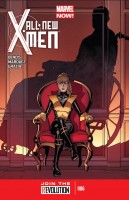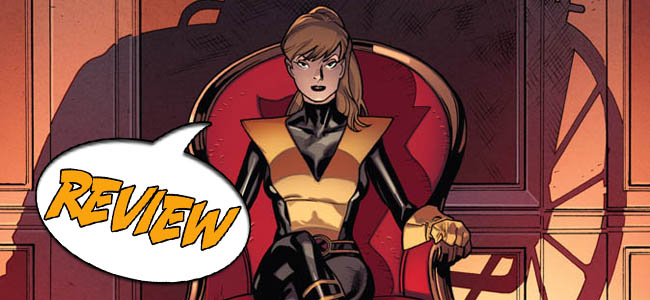Or – “Still Not Sure How I Feel About This Idea…”
I have recently realized something very odd that part of me already knew: Marvel Comics is always playing a short-term game. It should really have been obvious during the era of Avengers Assembled, or when Spider-Man’s identity was public knowledge for a year or two, but the editorial stance at the House of Ideas has openly become one of “Do some wacky stuff and we’ll pick up the pieces later.” To that end, we’ve gotten some great stories (parts of Fear Itself, the first thirty-odd issues of New Avengers, and a portion of Amazing Spider-Man, Hickman’s Fantastic Four stuff) and some stories that we’d all like to forget. (Civil War is the most obvious example for me.) Will the high concept of “time-traveling teenage X-Men in the 21st Century” stand with the likes of Invincible Iron Man, or are we in New Warriors territory? Your Major Spoilers review awaits!
 ALL-NEW X-MEN #6
ALL-NEW X-MEN #6
Writer: Brian Michael Bendis
Artist: David Marquez
Cover Artist(s): Stuart Immonen/WadeVon Grawbadger/Marte Gracia
Colorist: Marte Gracia
Letterer: VC’s Cory Petit
Editor: Nick Lowe
Publisher: Marvel Comics
Cover Price: $3.99
Previously, in All-New X-Men: Theorizing that one could time travel within his own lifetime, Dr. Henry McCoy stepped into the Quantum Leap accelerator and vanished… He woke to find himself in the past, facing mirror images that were once his own and driven against his own better instincts to change history for the better… And so Dr. Beckett finds himself foolishly bringing his friends, the founding members of the X-Men, to the present, trying to put right what once went wrong, and hoping each time that his next mutation won’t look like Tony The Tiger.
I’M AFRAID OF TOO MANY BENDIS-ISMS…
Brian Bendis is a writer with whose work I have a particularly tumultuous love/hate relationship. This issue opens quite well, with Jean Grey suddenly confronted by Magneto and the crazy grown-up version of her boyfriend Cyclops, both of whom warn her that “they” are coming to get her. It’s a great, kinetic opening sequence, and even when it starts to devolve into dream logic, it makes perfect sense. She awakens to find that her telekinesis has wrecked her entire room, and that headmistress Kitty Pryde has arrived to try to counsel her. On the one hand, I really love this interaction, hearkening back to the X-Men tales of my youth, but I find myself confused by how much “Marvel Time” has actually passed. Kitty is roughly twenty-ish, according to the last time I paid attention, but Jean seems to be a girl of roughly fourteen. As my brain tries to do the math on that, Cyclops flips out and steals Wolverine’s motorcycle (a clear riff on Wolverine doing the same in the first X-Men movie, right down to the Hugh Jackman leather jacket that he also horks), abandoning the constant side-glances and awkward moments that the student body of Xavier’s gives him. Artistically, David Marquez does a very good job here, following in Immonen’s footsteps effortlessly, giving us recognizable characters with great facial expressions, and delivering a dead-on traffic-stopping version of Storm, who arrives just in time to tell little Jeanie that the other team members are following her lead, making her the de facto leader of the team. (How that works with the half-dozen other X-teams out there, or even the fact that Storm has a mohawk in X-Force is left unexamined…)
SOME MORE BLATANT X-MEN MOVIE REFERENCES…
Wolverine follows Babyclops into Salem Center, and their interaction is weird on nearly every level. Wolverine goes back and forth from supportive big brother to berzerker-threatening-murder far too quickly for my tastes, and Scott’s problems adapting to the reality of the 21st Century are a bit too meta. If we presume for a moment that these X-Men actually came from 1963, then the references and jokes are pretty solid, but making that presumption leads to all sorts of other problems with the book (notably a grown-up Cyclops being eligible for Medicare.) There’s no real attempt here to explain it, which leaves part of my brain doing math throughout the whole issue. While I like the idea of young Cyclops playing against type, it just underlines the problems with adult Cyclops becoming such a ridiculously Flanderized stick-in-the-mud in the first place. The meeting of young Angel and grown Archangel is wonderfully realized (although I didn’t realize that Archangel had gone quite so ‘Flowers For Algernon’ in his characterization after the traumas of Uncanny X-Force) and the issue ends on an ominous note that, sadly, overdoes the trademark Bendis dialogue. (It sounds pretty awkward coming out of the mouth of Mystique, for certain.)
THE BOTTOM LINE: INTERESTING, BUT STILL TROUBLING.
The biggest problem with this story for me is the coyness about the timelines, with meta-jokes being played out about how long ago 1963 was when the characters can’t really have been much further back than the Clinton administration, given their ages. (That’s presuming that Cyclops was 15 or 16 at the founding of the X-Men and is over 30 now. If he’s supposed to be in his late twenties, we’re looking at more turn-of-the-century origins for the All-Old X-Men.) The problem certainly isn’t insurmountable, and there’s a lot of charm here to cover up any gaps in the timeline, as well as some very smooth art. Kitty and Wolverine playing mentor to the characters who were their senior back in the Claremont/Byrne days works quite well, and all in all, I stayed engaged throughout the book. All-New X-Men #6 is a head-scratcher in some ways, but it’s an interesting take on the characters (even if I wonder when they’ll press the reset button) earning 4 out of 5 stars overall.
DID YOU READ THIS ISSUE? RATE IT!
Reader Rating
[ratings]




6 Comments
I had the same problems as you regarding the ages/time periods when I reviewed the first couple books. It’s easier to try and just not think about it and enjoy the story. Of course that becomes hard when the writing wants to point out the inconsistencies.
I kind of wish comic companies would pick a period as the shared universe’s relative present, and stick to it. Sure, some centerpieces would get pretty dated, but it’d at least keep things consistent. Remember Batman the animated series? Barring the random computer tech, it had a kind of Art Deco aesthetic. It didn’t risk dating itself because it kind of existed in its own little world.
And then it started crossing over with the rest of the DCAU. Great stories were told, but the nebulous Randian time period it existed in was ruined.
For some reason I found using Flowers for Algernon as an adverb hilarious. Especially after referencing Quantum Leap.
One of the worst time period creeps I’ve seen occurs in the mystery books by Martha Grimes. Her protagonist, Richard Jury, was a child during World War II, and, in the books, is a police detective in his late 40s or early 50s, which was understandable when the first book was published in 1981, but has become a problem in the latest books, published in the 2000s. Mrs. Grimes has had to avoid outright mention of dates in the books since the hero would actually be in his 70s or 80s by now.
Comic books have always suffered the same sort of bracket creep. After all, Bruce Wayne would now be in his 80s or 90s and Superman/Clark Kent would be about 100 if they didn’t ignore dates. Which is almost a pity because the publishers have cut themselves off from quite a few interesting story lines, like explaining why Clark and Superman still stay young while the supporting cast like Lois and the Kents have passed on from old age, or having Wayne retire and pass on the mantle of the bat to somebody younger for real or, Peter Parker now being in his fifties and facing retirement in the near future.
DC has managed, so far, by occasional reboots and retelling the character’s origin story set in modern time (Superman’s arrival being in the 1970s instead of the 1920s, etc.) but it’s always rather bothered me when they do this, mostly because, growing up in the 60s, the origin versions I remember from my youth are the “true” origins – at least to me.
Marvel, on the other hand, hasn’t engaged in resetting the age brackets as much as DC which presents a problem when you realize that Spiderman would be in his 50s now, Mr. Fantastic would be pushing a hundred, and the original X-men should be applying for social security benefits, too.
Having the characters start time-travelling only highlights the difficulties. So which would be better? Cutting the characters loose from specific ages and dates – in which case, they shouldn’t included so many topical references and modern day gizmos – or rebooting the franchise every ten or twenty years? The sad thing is that the publishers don’t allow the more interesting things to happen: i.e., letting the characters age naturally – and when they do attempt to have a hero find a replacement it never lasts long, or we get some mess like what happened after The Death of Superman or Broken Bat, where they can’t hit the reset button fast enough to suit me.
I agree with the comments here regarding the awkwardness of the dating of the characters. I found myself strangely moved by the first issue of this series and excited by the concept of watching the original X-team having to face the terrible truth that the future is often never what we could have predicted, especially given all of the hope we invest in those expectations.
And I was perfectly prepared to let the question of whether the team was coming from the 1960s or some later period remain hazy and just go with the assumption that Bendis was trying to evoke a more emotional sense of the past, more the pastness of comic books and their characterizations than a necessarily specific year. BUT when he makes those jokes about phones and maps and bottled water (which made Cyclops look stupid frankly), then I found that delicate evocation wrecked for the sake of a couple of cheap gags. There is such lovely potential to this story-arc that I hope those more crass meta-tendencies are sidelined.
Yes, Cyclops can’t figure out why people pay ridiculous amounts of money for something that comes out of a faucet for super cheap or free, and yet HE’S the one who looks stupid.